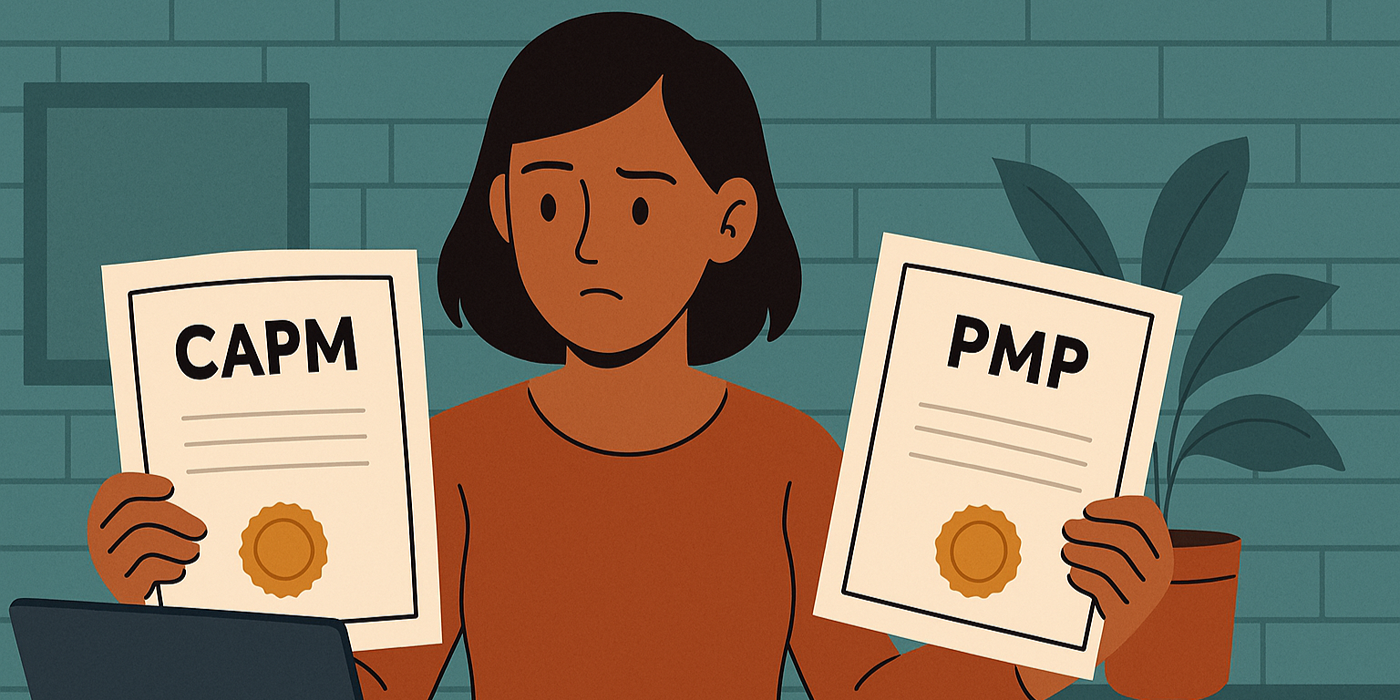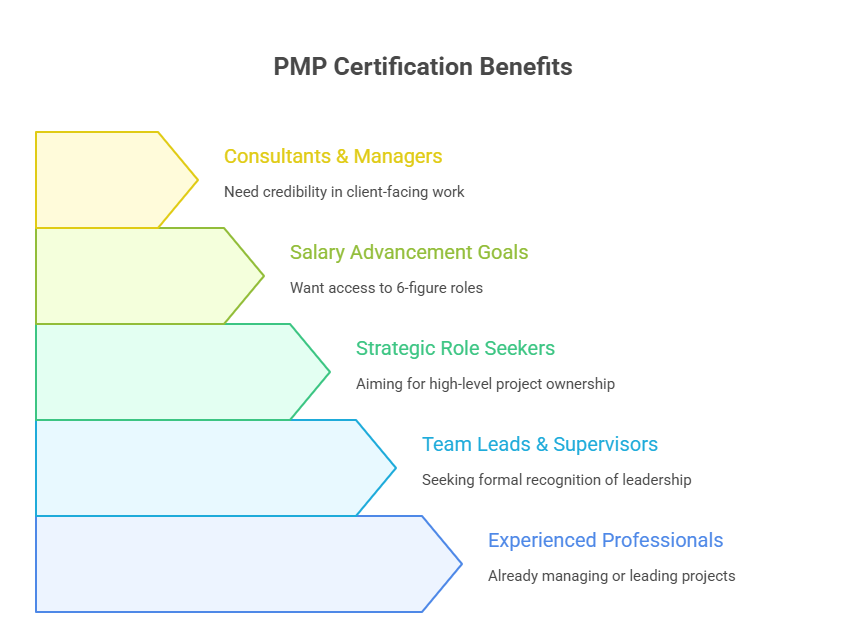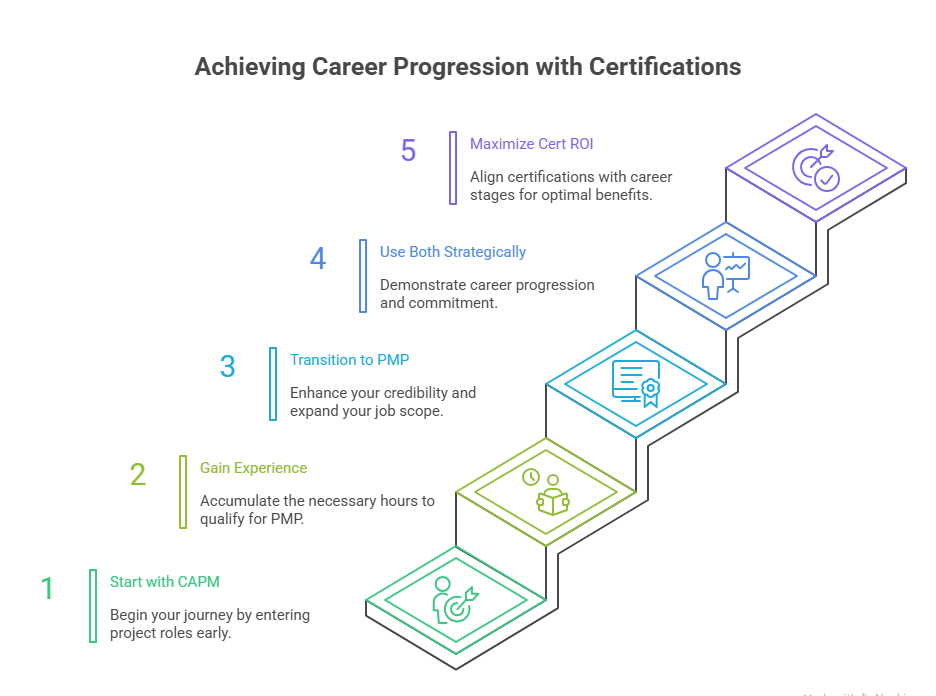CAPM vs PMP Certification Career Guide
Choosing the right project management certification isn’t just about adding credentials — it’s about positioning yourself for the right roles, responsibilities, and pay scale. Two of the most recognized paths are the CAPM Certification and the PMP Certification, both offered by PMI. But they serve very different professionals.
This guide cuts through the noise. You’ll get a side-by-side breakdown of both certifications, including costs, eligibility, career impact, and ROI. Whether you're just starting or aiming for leadership, this blog will help you pick the credential that gives you leverage — not just letters after your name.
Understanding the Core Differences
Eligibility Criteria
CAPM prerequisites
To qualify for the CAPM Certification, you need either a high school diploma or equivalent and 23 hours of project management education. No professional experience is required. This makes CAPM one of the few globally recognized certifications that allow newcomers to enter the project management space without prior experience. It's often used by students, interns, and professionals switching careers to demonstrate readiness for project coordinator or assistant roles.
PMP prerequisites
To be eligible for the PMP Certification, the requirements are significantly higher. Candidates need either:
A four-year degree, 36 months of project leadership experience, and 35 hours of project management training, or
A high school diploma (or associate degree), 60 months of leading projects, and the same 35 training hours.
This ensures PMP holders have deep, hands-on experience managing real-world projects, making the certification ideal for mid-to-senior professionals.
Cost Comparison
The CAPM exam costs $225 for PMI members and $300 for non-members. The PMP exam costs $405 for members and $555 for non-members. But cost isn’t just about exam fees — it's about return on investment. CAPM is more affordable up front, while PMP offers higher salary increases over time. Factor in training costs too: PMP training programs are typically more intensive and expensive due to the exam’s complexity.
Time Commitment & Exam Format
CAPM requires less preparation time, averaging 2–3 months of study. The exam has 150 questions (mostly knowledge-based), and you have 3 hours to complete it. PMP is far more rigorous: 180 scenario-based questions over 230 minutes. Most candidates spend 3–6 months preparing. PMP tests not only knowledge but judgment in real project scenarios, making it more demanding but also more respected.
Maintenance Requirements
CAPM must be renewed every 3 years by earning 15 PDUs (Professional Development Units). It's a manageable commitment and keeps entry-level professionals engaged with learning. PMP renewal is more demanding: you need 60 PDUs every 3 years, which requires attending workshops, creating content, or leading teams. This reflects PMP’s ongoing expectation of leadership and engagement within the profession.
| Criteria | CAPM | PMP |
|---|---|---|
| Eligibility | High school diploma + 23 hrs education | Bachelor’s + 36 months experience or 60 months experience |
| Experience Required | None | 3–5 years of project leadership |
| Exam Cost (Non-Member) | $300 | $555 |
| Study Time Needed | 2–3 months | 3–6 months |
| Exam Format | 150 questions, 3 hours | 180 questions, 230 minutes |
| Renewal Requirement | 15 PDUs every 3 years | 60 PDUs every 3 years |
Career Impact & ROI
Job Roles You Can Get With CAPM vs. PMP
The CAPM Certification prepares you for roles like project coordinator, junior project analyst, or assistant project manager. These are foundational positions where you're supporting project leads, updating schedules, and assisting with stakeholder communications. Employers value CAPM because it signals a commitment to learning project principles, even without direct experience.
The PMP Certification, however, unlocks more strategic roles: project manager, program manager, and even portfolio lead. PMP signals you’ve not only worked on projects — you’ve led them, solved complex issues, and delivered results. For employers, PMP is a validation of leadership, execution, and maturity in project environments.
Salary Potential
According to PMI’s most recent salary survey, PMP-certified professionals earn 16–32% more than their non-certified counterparts globally. In the U.S., the average PMP salary is over $120,000, while CAPM holders average $65,000–$85,000, depending on industry and location. The salary gap reflects the difference in responsibility, not just certification. PMP holders typically lead teams and budgets, while CAPM holders support execution.
Still, for new professionals, CAPM can lead to a 20–25% salary bump over uncertified peers. It’s a great first credential to unlock entry-level roles and gradually climb into six-figure salaries.
Industry Demand
PMP is required or preferred in 90% of project management job listings for mid-level and senior roles. It’s especially dominant in sectors like IT, construction, finance, and healthcare, where project outcomes have high stakes. Recruiters often filter candidates based on PMP status before even looking at resumes.
CAPM is increasingly recognized by employers who want to groom future PM leaders, especially in companies with internal career ladders. Startups, nonprofits, and agile firms value CAPM as a way to onboard organized, systems-minded entry-level talent who want to grow fast.
| Factor | CAPM | PMP |
|---|---|---|
| Job Roles | Project Coordinator, Junior Analyst | Project Manager, Program Lead |
| Average Salary (US) | $65,000–$85,000 | $110,000–$125,000 |
| Job Market Fit | Entry-level, support roles | Leadership, strategic roles |
| Industry Value | Growing recognition | Industry standard across sectors |
| ROI Timeline | Short-term entry | Long-term advancement & pay jump |
Who Should Choose CAPM?
For Beginners & Students
If you’re still in school or recently graduated, the CAPM Certification is the fastest way to signal career intent. It shows employers that you're serious about project management, even if you lack hands-on experience. CAPM is also ideal if you’re coming from a different field — such as marketing, engineering, or healthcare — and want to transition into project-based roles without starting from scratch.
Many entry-level roles now list CAPM as a preferred qualification. It helps new professionals stand out in saturated applicant pools, especially when they lack experience but have strong academic credentials or internships.
When You Lack Experience But Want a PM Career
Project management roles often require at least 2–3 years of experience, but CAPM helps bridge that gap. It offers credibility by validating your knowledge of PMI’s project management framework. This is especially helpful in internal transitions, like moving from a team assistant to a project coordinator.
Instead of waiting years to become “qualified,” CAPM lets you get interviews faster, justify internal promotions, and demonstrate a learning mindset — all without having managed full projects yet.
Strategic Use of CAPM Before PMP
One of the most underrated strategies is using CAPM as a stepping stone toward PMP. Since PMP requires thousands of hours of experience, most candidates can’t qualify immediately. CAPM allows you to:
Enter the profession early
Build hours while holding a credential
Get recognized by PMI early in your career
Many professionals use the CAPM-PMP pathway to move faster through promotions, earn trust with employers, and align with PMI’s standards from day one.
Who Should Choose PMP?
Experienced Professionals Looking for Growth
If you've already led or contributed heavily to projects, the PMP Certification isn't just a boost — it's a necessity. PMP validates your strategic thinking, leadership, and execution abilities across project lifecycles. It’s ideal for professionals in roles like project lead, business analyst, or technical manager who are ready to move into higher-responsibility positions.
With PMP, you're signaling that you're not learning project management — you’re already doing it. Employers view it as a mark of project leadership maturity, often tying it to promotions, pay increases, or even board-level exposure.
When You Need Recognition & Validation
PMP is globally recognized in over 200 countries and required by top organizations like IBM, Cisco, and Deloitte. If you're already performing the duties of a project manager but lack formal recognition, PMP gives you that external validation. It's especially valuable for those working in consulting, client-facing delivery roles, or regulated industries.
Holding a PMP instantly establishes trust. It tells hiring managers that you’ve been tested on real-world scenarios, not just theory. It’s a credential that travels well — across industries, borders, and even career pivots.
For Leadership & High-Paying Roles
PMP is often a gateway to six-figure roles like senior project manager, portfolio lead, or PMO director. These roles require not just technical ability but also stakeholder communication, budgeting, and resource management. PMP signals you’ve mastered both the hard and soft skills.
If your goal is to manage teams, own project outcomes, or handle cross-functional initiatives, PMP gives you the credibility to step up. It helps secure roles with greater autonomy, influence, and compensation — often faster than experience alone can provide.
CAPM and PMP in Career Planning
How to Progress from CAPM to PMP
One of the smartest long-term moves in project management is to start with the CAPM Certification and build toward the PMP. CAPM gives you early access to PMI’s methodologies, helping you develop the habits and vocabulary of seasoned project managers from the start. As you accumulate the required hours for PMP, you’ll already be operating within PMI’s framework, making PMP exam prep much easier later.
Professionals who follow this path often move faster through roles because hiring managers can see a clear commitment to the discipline. With each job, internship, or contract role, you're building your PMP eligibility while staying credentialed and visible in the field.
Leveraging Both for Long-Term Growth
Even after earning PMP, the value of having started with CAPM doesn’t disappear. It shows a progression that mirrors career growth, especially on resumes and LinkedIn profiles. Employers like to see deliberate upskilling — and this sequence proves you didn’t just cram for an exam, but invested in building competency over time.
By aligning your certifications with your career stage, you’ll avoid wasted time and money. CAPM opens doors. PMP cements your position. Together, they form a clear narrative of your expertise and ambition.
How APMIC’s Project Management Certification Helps You Decide
Career Consultation Support
Choosing between CAPM and PMP can be overwhelming without expert input. APMIC’s Project Management Certification program provides guided career consultations to help professionals determine the right path based on their experience, goals, and timelines. Whether you're exploring project management for the first time or deciding if you're ready for leadership roles, APMIC advisors help you clarify your ideal certification route.
This personalized support removes guesswork and gives you a strategy for certification, not just study materials. You're not navigating PMI’s framework alone — APMIC helps you move forward with precision and focus.
Clear Paths to Certification
APMIC doesn’t just offer training — it provides step-by-step guidance on qualifying for both CAPM and PMP, including how to log experience hours, prepare for the exams, and maintain your credentials long-term. Their programs are built to support both entry-level learners and experienced professionals with distinct tracks.
You’ll get clarity on:
Which certification is best for your career stage
How to transition from CAPM to PMP
What industry expectations each cert helps you meet
By aligning your training with your current and future goals, APMIC helps you maximize ROI from the very first course.
Frequently Asked Questions
-
The main difference lies in experience and role alignment. CAPM is designed for entry-level professionals or career switchers who want to demonstrate project management knowledge without real-world experience. It validates your understanding of PMI’s project management framework but doesn't require hands-on practice. PMP, in contrast, is for professionals who have already led projects and want to validate their leadership and execution skills. It focuses on applied knowledge, scenario-based judgment, and strategic project delivery. While CAPM helps you enter the field, PMP positions you as an expert already capable of owning outcomes and managing full project lifecycles.
-
CAPM generally takes about 2–3 months of part-time study, depending on your familiarity with PMI’s PMBOK Guide and other foundational concepts. The exam is more knowledge-based, which means the prep is focused on memorization and conceptual understanding. PMP prep is more intensive. Candidates often spend 3–6 months studying, with a heavy emphasis on real-world application, agile frameworks, and situational analysis. PMP preparation also involves more practice exams and in-depth case study reviews, making the time commitment higher — but also more rewarding in terms of exam difficulty and long-term credibility.
-
Yes, the CAPM Certification is often enough to help you land entry-level project roles like project coordinator, scheduling assistant, or junior analyst. It’s recognized globally and shows employers that you understand project processes, terminology, and structure. However, because it’s an entry-level credential, it won’t qualify you for senior or leadership positions. Many organizations use CAPM to identify trainable talent who can grow into more strategic roles. If you pair CAPM with an internship, degree, or relevant coursework, it can significantly improve your chances of breaking into project management roles faster.
-
Absolutely — PMP is based on experience, not job titles. If you've led teams, managed timelines, handled budgets, or owned deliverables in any capacity, you may already qualify. Even roles like business analyst, operations lead, or team supervisor often include project management tasks. PMP certification helps formalize those skills and tells employers you’re ready for higher-level responsibilities, even if your current title doesn’t say “project manager.” Many professionals use PMP to make the jump into official PM roles or move into consulting, where credentials carry extra weight.
-
Yes, both certifications expire after three years, but the renewal process differs. To renew CAPM, you need to earn 15 Professional Development Units (PDUs) — typically through online courses, webinars, or workshops. It’s a relatively light commitment meant to keep you engaged and current. PMP requires 60 PDUs for renewal, reflecting its higher-level expectations. These can be earned through speaking engagements, course creation, project leadership, or formal learning. If you let either certification lapse, you’ll need to retake the exam. Staying current ensures you remain aligned with PMI’s evolving standards.
-
PMP offers a much higher salary ceiling. According to PMI’s salary survey, PMP-certified professionals in the U.S. earn $25,000–$35,000 more annually on average than non-certified peers. CAPM holders typically start in the $65,000–$85,000 range depending on location and industry, while PMP-certified professionals average $110,000–$125,000. The gap reflects both the scope of responsibility and the seniority of the roles each certification supports. That said, CAPM can still lead to meaningful salary increases early in your career — especially when paired with hands-on learning and a plan to transition into PMP within a few years.
-
Yes, if you meet the experience and education requirements, you can go straight to PMP without earning CAPM. Many professionals who have already led projects or have 3–5 years of relevant experience choose to bypass CAPM entirely. However, if you're unsure about your eligibility or need time to build experience, CAPM is a strategic way to enter the project management profession with credibility. It helps you get interviews, understand PMI’s framework early, and eventually qualify for PMP with more confidence and structured preparation.
Final Thoughts
Both CAPM and PMP certifications offer valuable, globally recognized pathways — but their impact depends entirely on where you are in your career. CAPM is ideal for students, career changers, and entry-level professionals who want to break into project management with credibility. It opens doors, fast-tracks interviews, and gives you a foundation to build real experience.
PMP is for those ready to lead. If you’ve already been managing projects, delivering outcomes, or driving initiatives, PMP provides the recognition, salary boost, and trust needed to scale into leadership or consultancy.
Start with where you are — and choose the credential that meets your current stage, not your ideal future. Then plan your next move with clarity, confidence, and certifications that move your career forward.
Which certification are you more likely to pursue?




